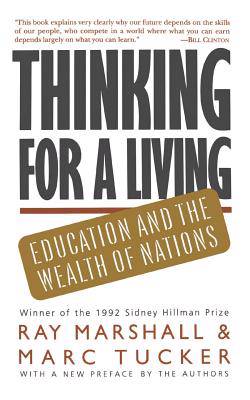
Door een staking bij bpost kan je online bestelling op dit moment iets langer onderweg zijn dan voorzien. Dringend iets nodig? Onze winkels ontvangen jou met open armen!
- Afhalen na 1 uur in een winkel met voorraad
- Gratis thuislevering in België vanaf € 30
- Ruim aanbod met 7 miljoen producten
Door een staking bij bpost kan je online bestelling op dit moment iets langer onderweg zijn dan voorzien. Dringend iets nodig? Onze winkels ontvangen jou met open armen!
- Afhalen na 1 uur in een winkel met voorraad
- Gratis thuislevering in België vanaf € 30
- Ruim aanbod met 7 miljoen producten
Zoeken
€ 38,95
+ 77 punten
Omschrijving
Why should employers pay American workers much more to work far fewer hours a year than the competition? They won't--unless Americans know more and can do more than the workers with whom they compete. Thinking for a Living is the first book to address head-on the issue of the appalling mismatch between what our economy needs and what our educational institutions actually provide. A massive imbalance between the resources available for the education of our managerial, technical, and professional workers on the one hand, and our line workers on the other, threatens our economic survival, according to Marshall and Tucker. The book provides a blueprint for the radical reconstruction of our schools, following much the same principles that allowed some of America's leading industrial organizations to rescue themselves from the brink of ruin by greatly raising productivity without increasing costs. But education, the authors point out, is far more than schooling. All the major functions of our society must function as integrated learning systems. This book spells out how families, communities, and, most of all, businesses can contribute to the effectiveness of our most valuable resource: people. The American educational system is designed to meet the manpower needs of a bygone era. If America is to survive in the infinitely more demanding economic environment of the next century, we must maximize the skills of our work force. Our economic policies will fail--and our standard of living will fall--unless they are linked to an aggressive education policy that results in unprecedented levels of performance.
Specificaties
Betrokkenen
- Auteur(s):
- Uitgeverij:
Inhoud
- Aantal bladzijden:
- 304
- Taal:
- Engels
Eigenschappen
- Productcode (EAN):
- 9780465085576
- Verschijningsdatum:
- 1/09/1993
- Uitvoering:
- Paperback
- Formaat:
- Trade paperback (VS)
- Afmetingen:
- 130 mm x 204 mm
- Gewicht:
- 340 g

Alleen bij Standaard Boekhandel
+ 77 punten op je klantenkaart van Standaard Boekhandel
Beoordelingen
We publiceren alleen reviews die voldoen aan de voorwaarden voor reviews. Bekijk onze voorwaarden voor reviews.











